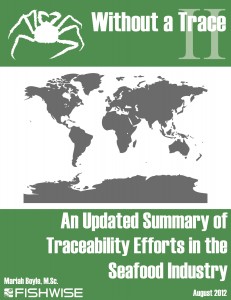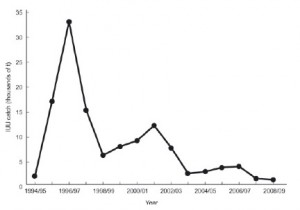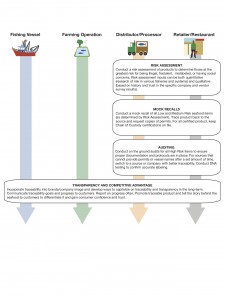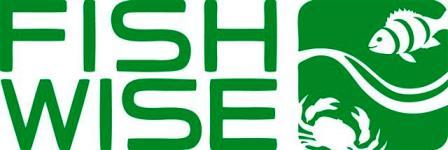Posts Tagged ‘summer’
Without a Trace…
 It’s officially here! All my hard work this summer has come together in one report that was printed and announced yesterday! Without a Trace II: An Updated Summary of Traceability Efforts in the Seafood Industry can be downloaded using that link or on this page.
It’s officially here! All my hard work this summer has come together in one report that was printed and announced yesterday! Without a Trace II: An Updated Summary of Traceability Efforts in the Seafood Industry can be downloaded using that link or on this page.
It’s an expanded (50 pages, to be exact) version of the original report, that summarizes everything from the history of seafood traceability, to the laws and international agreements that pertain to traceability, to why seafood traceability is so important in the first place. It also has a long list of seafood certification companies, traceability companies, DNA testing companies, nonprofits and industry groups that work in seafood traceability, with summaries about what each group is working on. There’s a list of all the current IUU blacklists, as well as pages of useful links, references and contact information for all of the organizations mentioned. The paper wraps up with suggested next steps for both seafood business and the traceability movement as a whole.
So why is seafood traceability so important?

Supply Chain including subsistence fishing, wild capture fisheries, aquaculture, recreation fishing and processing & distribution.
Historically seafood traceability was important for food safety, specifically being able to trace back food-borne illness outbreaks to the origin. Now, it’s also important for cases of fraud, as mislabeling rates can be as high as 60%, depending on the region and type of fish. IUU fishing is a global problem, with economic losses from $10-23.5 billion, which represents 11-26 million tons of seafood a year. The illegal fishing industry is also rife with human rights violations, due to the lack of transparency and accountability. Traceability assures that the seafood you’re eating was not sourced illegally, and is free of human rights violations. In addition, traceability can help prove the sustainability of the system as well as be a marketing tool for knowledgeable consumers.
The case for traceability is growing and gaining momentum every day. While the challenges to setting up 100% traceable supply chains are major–geography, technology, business being the biggest areas–the rewards are great, and the industry is heading that direction. This paper is a great resource for those interested in seafood traceability, industry members and those looking for next steps in their business.
The two pages below are the different recommendations for different sectors of the fishing industry, including fishing vessels, aquaculture, processing & distribution, and retailers & restaurants.
Blogging Away
Another blog, this time about the 30th session of COFI and a new award aimed at deterring Illegal, Unregulated and Unreported Fishing.
Guest blogger for FishWise
I wrote a guest post for the FishWise blog!
My post was a review of the journal article entitled “Global Cooperation among Diverse Organizations to Reduce Illegal Fishing in the Southern Ocean.” As it turns out, collaboration between diverse organizations can go a long way toward addressing international governance issues. In fact, the authors ended by saying that this one case study shows that international environmental issues don’t necessarily depend of the creation of new governmental regimes, they can be addressed through existing organizational networks.
The graph below is from the article and shows the weight of tooth fish caught by IUU fishing in the Southern Ocean between 1995 and 2009.

Link: http://www.fishwise.org/press/blog/141-reducing-illegal-unregulated-and-unreported-iuu-fishing
FishWise
So what exactly is FishWise? And more importantly why would someone want to be fish wise?

According to their website “FishWise is non-profit organization that promotes the health and recovery of ocean ecosystems by providing innovative market-based tools to the seafood industry.” In normal English, that means that FishWise works with seafood businesses to help them improve their traceability systems. They can also conduct risk assessments to identify products that are likely to be untraceable or coming from illegal sources. They work with companies like Target, Safeway, New Leaf and Bi-Rite to help them publicly communicate their commitment to sustainability and transparency, and improve their product mix over time.
So why would someone want to be fish wise? So that you can be certain the fish you’re enjoying contributes to the well being of the worlds ocean, instead of depleting it.
In the office

Just another day in the office…
My favorite thing about the FishWise offices (other than it’s proximity to the beach) is that it’s full of plants! While the angle of this shot doesn’t quite capture that, from where I’m sitting right now I see no less than 12 plants in this part of the office alone.
CBE Summer Fellowship
First day in the office! This summer I’ll be working on seafood traceability with FishWise, an organization based in Santa Cruz.






